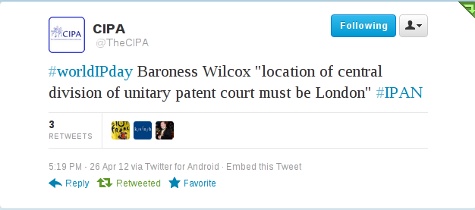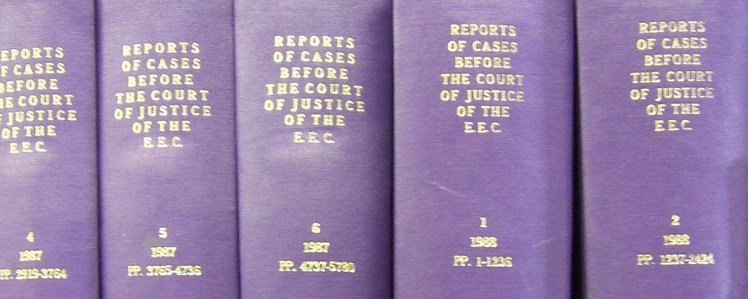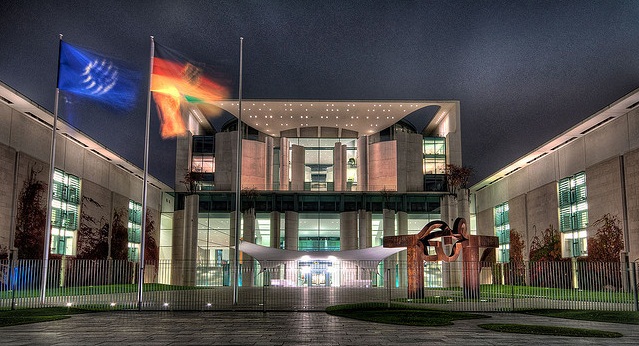As reported here and elsewhere [1, 2, 3], the European Council agreed on the EU Unitary Patent and a EU Unified Patent Court at last week’s Brussels EU summit after volatile negotiations – by ‘suggesting’ two significant amendments (see summit conclusion, page 2, item 3) as compared to what was know from the latest available draft text of the Unitary Patent Regulation dated 23 June 2011 (see here and here).
EU Court of Justice: The more severe one of those amendments that apparently was pushed through by UK Prime Minister David Cameron to please his eurosceptics allies at home, demands
that Articles 6 to 8 of the [Unitary Patent] Regulation [...] to be adopted by the Council and the European Parliament be deleted
essentially meaning that substantive EU patent law will not any more be subject to legal order of the Union highest court, the European Court of Justice (CJEU). I share my colleague’s view that this is nothing less than “an open declaration of deep mistrust, if not political warfare of significant parts of the UK conservatives against the CJEU and thus the European Union as a whole.
This move, however, could not escape the eyes of the European Parliament, which originally wanted to nod through this matter tomorrow (4 July 2012) whereas meanwhile the item was removed from the agenda under the harsh critics of rapporteurs Bernard Rapkay (S&D, DE) and Klaus-Heiner Lehne (EPP, DE): “scandalous breach of procedure“, “oriental bazaar” (did they read this item?), ”case would go straight to the European Court of Justice“. Due to the Council’s amendments, the first reading is thus rendered null and void.
It appears that the proudness of the Danish Presidency as well as the official cries of joy of e.g. EPO President Benoît Battistelli (“historic breakthrough“) and EU Commissioner Michel Barnier (“decisive step“) came far too early while stakeholders ask themselves if this mess could not have been prevented by a more transparent process, more cooperation with the potential system users, less political tactics, and less national egoisms and horse trading. It is depressive to say, but if the implementation of a reasonable EU patent system was the litmus test for Europe’s capacity for efficient policy-making, the conclusion can only be that the striking deficiencies of the EU’s political management appear to be insurmountable.
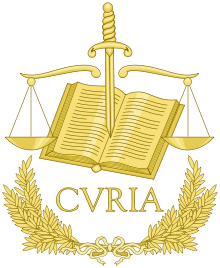 As reported, last week’s European Council summit has reached an agreement on the EU Unified Patent and a EU Unified Patent Court after volatile negotiations on 29 June 2012.
As reported, last week’s European Council summit has reached an agreement on the EU Unified Patent and a EU Unified Patent Court after volatile negotiations on 29 June 2012.
The EU Council thus made a big step forward on its way to achieve the final goal, as expressed in the annex of Doc 10059/12 of 24 May 2012:
On the 1st of April 2014 the system should be ready for the first registration of a European patent with unitary effect.
However, a number of steps – and one big legal problem – still remain to be taken. Already this July, the EU Parliament will have its first plenary session on the EU Patent Package that was postponed on 19 December 2011 by JURI (cf. minutes) and the EU Council will consider the issue as well:
- 3./4. July 2012: Parliamentary deliberations and votes on the three aspects of the “EU Patent Package” (unitary patent, translation arrangement, unified patent court);
- July 2012: Adoption of the Unitary Patent Regulation (unitary patent, translation arrangement) by the EU Council.
But it cannot be expected that the process will run smoothly, as the top-level negotiations at last week’s EU Summit ‘suggested’ – apparently under the pressure of David Cameron and eurosceptic Tory MPs lead by Bill Cash, Chairman of the influential Scrutiny Committee and ‘herald of the apocalypse‘ -
that Articles 6 to 8 of the [Unitary Patent] Regulation [...] to be adopted by the Council and the European Parliament be deleted.
To answer the above question right away, I do not hope so because otherwise the future of the European Community/Union, the great idealistic and visionary European project, would lie in ruins already. As a patent professional and keen enthusiast of the European idea, please allow me to share some personal comments based on the findings of my earlier posting on the Deficiencies of the EU Legislative Process for Implementing a Unified Patent Infrastructure, namely
- ignorance as to users and experts and their (mostly) well-founded observations;
- a striking lack of transparency preventing public involvement;
- an information policy that disguises more than it discloses; and
- national egoisms, inappropriate horse-trading and power games.
As already expressed earlier, I think that these frightening mechanisms and structural deficiencies of the European policy-making process may endanger stability and acceptance of and confidence in the European Union as a whole. As none of those features is adequate for a democratic legislation process in a cooperating Europe, the conclusion might be that Europe’s democracy is in danger. This, apparently, is at least the opinion of Mr Martin Schultz, President of the European Parliament, who recently demanded that a “restart” of European democracy is required, as “the Union must make the decision-making process more transparent so that a genuine European public sphere can emerge”. Well roared, lion!
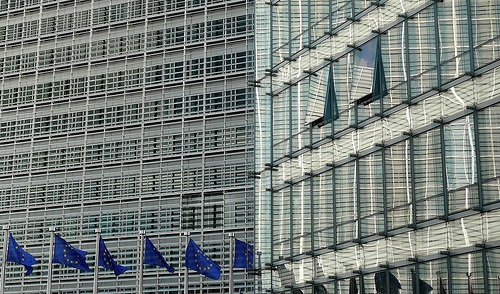
While some understand the 'Berlaymont' façade as symbol for a spirit of transparency, openness, and citizen involvement of EU policy making, others only recognise a good business for window wipers.
The epic and painful process of drafting and implementing a unified European patent infrastructure, which got stuck again on the latest Competitiveness Council meeting of 31 May/1 June 2012 (see our reports here and here as well as further coverage [1], [2]) discloses frightening mechanisms and structural deficiencies of the European policy-making process that may endanger stability and acceptance of and confidence in the European Union as a whole, particularly before the background of the current severe financial and depths crisis that shakes the Union like nothing else before.
Upon a closer look at the process, four major problems can be identified that prevent EU politicians to find a reasonable solution satisfying the needs of the European innovative economy:
- Ignorance as to users and experts and their mostly well-founded observations;
- A striking lack of transparency preventing public involvement;
- An information policy that disguises more than it discloses; and
- National egoisms, inappropriate horse-trading and power games.
Below I collect some striking examples of each of the above four phenomena.
Anti-Patent Campaigners put their trust in François Hollande as EU Council attends to Unitary Patent Court again

The newly elected President of France, François Hollande promising "change". Will he be the first anti-patent campaigner governing an EU state?
Now that François Hollande took office as the new President of France after his marginal victory in the French presidential elections this May, he will now introduce himself to official EU policy on his first Competitive Council meeting on May 31/June 1. The draft agenda for this meeting (cf. item 19), reading “Draft agreement on a Unified Patent Court and draft Statute – Political agreement“, electrifies observers of and parties involved the ongoing European patent legislation saga (see also press release, middle of page 5).
In recent months the upcoming French elections brought the negotiations on the Unified Patent Court Agreement to a complete standstill, as the dynamics between the French, British and German heads of govenment and the general political climate is a crucial factor in this legislative process, especially since the only serious and realistic candidates for the attractive seat of the new UPC Central Division are Paris, London, and Munich and it is frequently announced through official channels that this question is the only remaining open issue.
The EU Council expressed already in January this year its believe that a final agreement can be reached in June 2012 (see official statement) and it was the President of the European Council, Herman Van Rompuy, who clarified in a recent letter that he hopes (or expects) the remaining issues to be sorted out at next week’s Competitiveness meeting:
“[...] This deal is needed now, because this is an issue of crucial importance for innovation and growth. I very much hope that the last outstanding issue will be sorted out at the May Competitiveness Council. If not, I will take it up at the June European Council.”
But IP matters will not become easier in Europe with Mr Hollande, given his apparent openness to positions of critics of the current patent system. In fact, some of the answers (pdf) of Ms Fleur Pellerin (@fleurpellerin), responsible for the digital economy in Hollande’s campaign team, on a tendentious pre-election questionnaire of French anti software patent group “April” appear as if the socialist candidate for president (or his spokeswoman) was one of the ideological leaders of that pressure group:
The patentability of software would induce a partitioning of innovation that would be harmful to the ecosystem seen in its digital together. I am therefore opposed to the patenting of software.
Yesterday, in Berlin the German industry association Bundesverband der Deutschen Industrie e.V. (BDI) has held a conference titled Tag des geistigen Eigentums – Geistiges Eigentum verpflichtet (Intellectual Property Day - Property entails obligations). According to a report published on Heise’s Newsticker the topic of the pending proposal for a Unitary Patent was discussed.
Reportedly Mr Christoph Ernst from German Ministry of Justice (Bundesjustizministerium) has re-affirmed his expectation that a conciliation on this matter can and will be reached until next meeting of the EU Competitiveness Council to be expected end of May or in June later this year.
Mr Lothar Steiling, Director Intellectual Property with Bayer AG and President of the VPP (German Association of Intellectual Property Experts), is reported to have supported the proposed enhanced co-operation to create a Unitary Patent on behalf of those circles of insustry which have decided not to oppose the pending draft contrary to the dismissive language used especially be EPLAW. Another supportive statement came from Mr Andreas Thürer, Director Intellectual Property with Bosch Rexroth.
Ms Kerstin Jorna from EU Commission DG Internal Market is said to have argued more cautiously, considering that the proposal still might fail. She explicitly appealed to the representatives of German Industries to come forward in support of the Unitary Patent.
Furthermore, statements of FFII as well as of representatives of the German Piratenpartei are said to have expressed their concerns especially that the Unitary Patent might turn out to be a tool to facilitate legal acceptance of software patents (patents on computer-implemented inventions CII).
Continue reading »
Articles 6 to 9 of the Unitary Patent Regulation relate to substantive patent law. They regulate the right to prevent direct and indirect use of the invention (Art. 6 and 7, respectively), the limitation of the effects of the ‘Unitary Patent‘ (Art. 8) and exhaustion of the rights conferred by the ‘Unitary Patent‘ (Art. 9).
As the question of which EU member state will receive the Central Division of the EU Unified Patent Court (see here, here, and here) is officially seen as the only remaining obstacle to the Unified Patent Court Agreement, the Unitary Patent Regulation already received green light from the EU Parliament’s legal committee (JURI) in late December (see press release) so that the EU Council already began to linguistically finalise the Regulation text in early January.
THE DISPUTE ON ARTICLES 6 TO 9
Even so, a strong and illustrious ‘opposition movement’ of legal professionals and their associations (e.g. EPLAW and Jochen Pagenberg, European Patent Judges and Sir Robin Jacob, Professor Krasser, CIPA), industry representatives (e.g. ICC, IP Federation), and a few politicians (e.g. JURI member Cecilia Wikström (SE, ALDE) [1, 2, 3] and UK IP Minister Baroness Wilcox) demanded Articles 6 to 8/9 to be removed from the Regulation to prevent substantive patent law from becoming subject to review by the European Court of Justice via referral questions according to Article 267 TFEU.
In one of our latest postings on the legal and political shadows of the Unified Patent Court Agreement we concluded that the stuck ‘seat issue’ will now have to be decided on the top executive level, i.e. in personal talks between Federal Chancellor Angela Merkel, Prime Minister David Cameron, and - should he survive the French presidential election in April/May 2012 - Nicolas Sarkozy as the only serious and realistic bits were Berlin, London, and Paris, respectively.
While the German government always claimed the seat of a European Patent Court, should such court ever exist, London became a candidate rather late and only after intervention of the UK legal profession and Paris was considered a compromise location to prevent a deadlock between Munich and London. None of these bits is ideal for everyone as each has considerable drawbacks, as has been recently summarised on FT.com “few other EU countries are happy with a Munich seat because the city is already the home to EPO“, “Britain lacks goodwill or allies“, and “French inflexibility has been damaging“.
After months of intense debate in the EU Council and the EU Parliament’s Legal Affair’s Committee (JURI), the European Parliament was scheduled to have its fist plenary session on the EU Patent Package (Unitary Patent Regulation, Language Regime Regulation, Unified Patent Court Agreement) on coming Wednesday, 14 February 2012.
While Google Search still delivers an entry “Plenary sitting – European Parliament Tuesday, 14 February 2012 Draft agenda. 09:00 – 10:20 Debates. European patent. Creation of unitary patent protection.“, the final draft agenda now announces a Fisheries debate instead.

Absent of any reliable source the tea leaves give some cryptic clues: Munich on schedule, London delayed, Paris vanished?
The story so far. As we all know, the talks on the new EU-wide patent infrastructure (consisting basically of the Unitary Patent Regulation and the Unified Patent Court Agreement) run aground in late December despite quite some rounds of negotiations producing encouraging press releases according to which the so called ‘EU Patent Package’ was considered “broadly accepted in substance”. However, at the end of the Polish EU Presidency‘s half-year term, the adoption of the “Warsaw Patent Convention” – a term coined by Polish Deputy Prime Minister Pawlak – could not be celebrated as expected due to ongoing dissension.
Even though it was spread after the failed Competitiveness Council of December 5/6 through semi-official channels (e.g. tweets and press report) that the whole deal was almost done and only the seat of the central division of the Unified Patent Court remained to be decided, real doubts and harsh criticism almost immediately occurred and stakeholders saw an opportunity to again open the discussion on various substantive legal issues (see e.g. EPLAW resolution, FICPI position paper), such as on Articles 6 to 9 of the Regulation (effects of patents) that require substantive patent law to be subject to review by the CJEU.
Despite ongoing controversies and criticism (“desaster“, “bound to fail“) as to substantive issues, the politicians declared the dice cast for the Unitary Patent so that the Regulation was not unwrapped again for negotiations as to the legal merits. In fact, the Regulation for the Unitary Patent meanwhile got a green light from the powerful legal committee (JURI) of the EU Parliament in late December and the EU Council began to linguistically finalise the Regulation text in early January.
The k/s/n/h::law blog
Some of the patent attorneys of the KSNH law firm have joined their efforts to research what is going on in the various branches of IP law and practice in order to keep themselves, their clients as well as interested circles of the public up to date. This blog is intended to present results of such efforts to a wider public.
Blog Archives
- November 2013 (2)
- October 2013 (1)
- September 2013 (1)
- August 2013 (2)
- July 2013 (3)
- June 2013 (5)
- March 2013 (5)
- February 2013 (4)
- January 2013 (5)
- December 2012 (5)
- November 2012 (5)
- July 2012 (5)
- June 2012 (8)
- May 2012 (5)
- April 2012 (3)
- March 2012 (4)
- February 2012 (5)
- January 2012 (6)
- December 2011 (12)
- November 2011 (9)
- October 2011 (9)
- September 2011 (4)
- August 2011 (7)
- July 2011 (4)
- June 2011 (1)
Blog Categories
- business methods (6)
- EPC (7)
- EPO (12)
- EU law (92)
- ACTA (8)
- CJEU (4)
- Comitology (1)
- competition law (2)
- Enforcement (6)
- EU Unified Patent Court (62)
- FTA India (1)
- TFEU (2)
- Trade Marks (5)
- European Patent Law (37)
- German Patent ACt (PatG) (1)
- German patent law (5)
- Germany (6)
- Pirate Party (3)
- International Patent Law (4)
- PCT (2)
- IP politics (10)
- licenses (2)
- Litigation (5)
- Patentability (7)
- Patents (12)
- Piratenpartei (2)
- Software inventions (10)
- Uncategorized (9)
- Unitary Patent (24)
- US Patent Law (4)
Comments
- kelle on Germany: Copyright Protection More Easily Available For Works Of “Applied Arts”
- Time Limits & Deadlines in Draft UPCA RoP: Counting The Days - KSNH Law - Intangible.Me on Wiki Edition of Agreement on Unified Patent Court Agreement (UPCA)
- Time Limits & Deadlines in Draft UPCA RoP: Counting The Days | ksnh::law on Wiki Edition of Agreement on Unified Patent Court Agreement (UPCA)
- Wiki Edition of Agreement on Unified Patent Cou... on Wiki Edition of Agreement on Unified Patent Court Agreement (UPCA)
- European Commission Takes Next Step Towards Legalising Software Patents in Europe | Techrights on EU Commission publishes Proposal of amendend Brussels I Regulation for ensuring Enforcement of UPC Judgements
Blogroll
- 12:01 Tuesday
- America-Israel Patent Law
- Anticipate This!
- AwakenIP
- BlawgIT
- BLOG@IPJUR.COM
- BP/G Radio Intellectual Property Podcast
- Broken Symmetry
- Class 46
- Director's Forum: David Kappos' Public Blog
- Gray on Claims
- I/P UPDATES
- IAM Magazine Blog
- Intellectual Property Intelligence Blog
- IP Asset Maximizer Blog
- IP CloseUp
- IP Dragon
- IP Watch
- IP Watchdog
- IPBIZ
- ipeg
- IPKat
- ITC 337 Law Blog
- Just a Patent Examiner
- K's Law
- MISSION INTANGIBLE
- Patent Baristas
- Patent Circle
- Patent Docs
- Patently Rubbish
- PatentlyO
- Patents Post-Grant
- Reexamination Alert
- SPICY IP
- Tangible IP
- The 271 Patent Blog
- The Intangible Economy
- THE INVENT BLOG®
- Think IP Strategy
- Tufty the Cat
- Visae Patentes
The KSNH blogging landscape


This blog and the German-language sister blog k/s/n/h::jur link to the two popular and privately run blogs IPJur und VisaePatentes and continue their work and mission with a widened scope and under the aegis of our IP law firm.
ksnhlaw on Twitter
- No public Twitter messages.
 KSNH::JUR Feed (german)
KSNH::JUR Feed (german)- Ist Verschlüsselung passé? September 6, 2013Auf verschiedenen Feldern beruflicher Praxis ist dafür zu sorgen, dass Kommunikation vertraulich bleibt. Die trifft beispielsweise für Ärzte zu, aber auch für Anwälte, darunter auch Patentanwälte. Einer der zahlreichen Aspekte, die in diesem Zusammenhang eine Rolle spielen, ist die Technik, um die Vertraulichkeit beruflicher Kommunikation sicherzustellen. Wa […]
- EU-Einheitspatent: Demonstrativer Optimismus und Zahlenmystik allerorten – Naivität oder politische Beeinflussung? June 26, 2013Nach mehreren vergeblichen Anläufen zur Schaffung eines EU-weiten Patentsystems wurde 1973 als Kompromiss das Europäische Patentübereinkommen unterzeichnet, welches unabhängig von der seinerzeit noch EWG genannten Europäischen Union System zur zentralisierten Patenterteilung mit nachgeordnetem Einspruchsverfahren durch das Europäische Patentamt schuf. Wie wi […]
- Moderne Zeiten oder: DPMA und Patentgericht streiten über die elektronische Akte April 25, 2013Bekanntlich hat das Deutsche Patent- und Markenamt (DPMA) im Jahre 2013 mit der rein technischen Fertigstellung der Einrichtungen zur elektronischen Akteneinsicht einen wichtigen Meilenstein seines Überganges von der Papierakte zur “elektronischen Akte” erreicht. Im DPMA werden aber bereits seit dem 01. Juni 2011 Patente, Gebrauchsmuster, Topografien und erg […]
- Gutachten zu Forschung, Innovation und technologischer Leistungsfähigkeit Deutschlands 2013 March 11, 2013Unter dem Datum vom 28. Februar 2013 ist die Bundestags-Drucksache 17/12611 veröffentlicht worden Sie trägt den Titel Unterrichtung durch die Bundesregierung - Gutachten zu Forschung, Innovation und technologischer Leistungsfähigkeit Deutschlands 2013. Die Bundesregierung legt dem Deutschen Bundestag seit dem Jahr 2008 […]
- 3D-Printing: Zum Filesharing von 3D-Modelldaten February 25, 2013In meiner kleinen zuvor angekündigten Reihe über rechtliche Aspekte des 3D Printing komme ich heute auf die Frage zu sprechen, ob die Hersteller von Gerätschaften es hinnehmen müssen, wenn Ersatztreile davon – vom Brillengestell über Smartphone-Gehäuseteile bis hin zu Rastenmähermotor-Abdeckungen – gescannt und die daraus […]
- Ist Verschlüsselung passé? September 6, 2013



